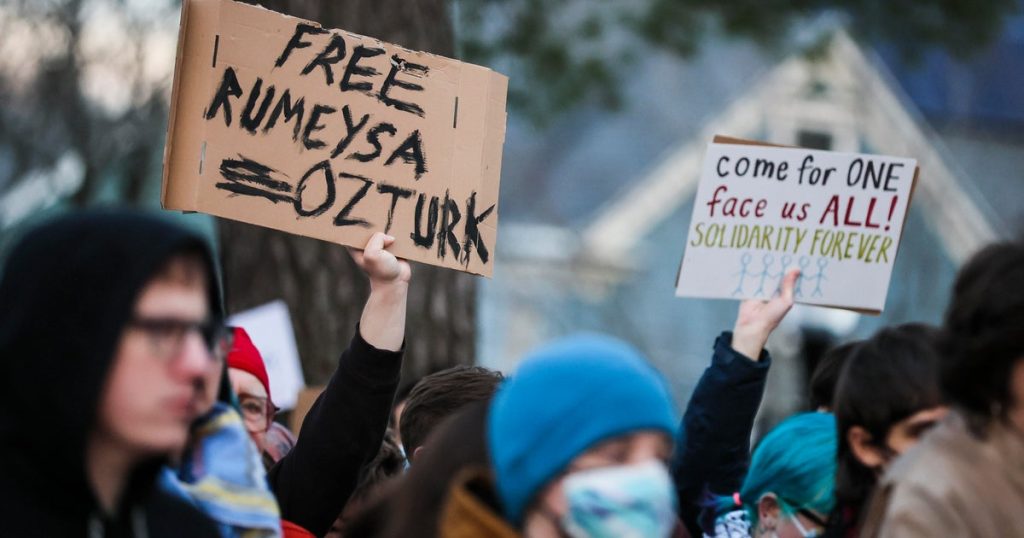A federal appeals court has mandated the Trump administration to comply with a lower court’s ruling requiring the transfer of Tufts Ph.D. student Rumeysa Ozturk from a Louisiana detention facility to Vermont. This order comes after the court rejected an emergency appeal from the administration regarding Ozturk’s detention amid concerns over her constitutional rights. As Ozturk awaits her bail hearing, which is scheduled to take place in Vermont, the implications of her case could resonate well beyond her individual circumstances.
| Article Subheadings |
|---|
| 1) Court Orders Compliance Amid Constitutional Concerns |
| 2) Ozturk’s Immigration Status and Arrest |
| 3) Legal Proceedings and Challenges Ahead |
| 4) Responses from Civil Liberties Advocates |
| 5) Broader Implications of Ozturk’s Case |
Court Orders Compliance Amid Constitutional Concerns
In a significant ruling, the U.S. Court of Appeals for the 2nd Circuit has directed the Trump administration to adhere to a district court order for the transfer of Rumeysa Ozturk, a Tufts University Ph.D. student, from her current location in Louisiana to Vermont. The court’s decision came after it denied an emergency request from the administration to halt the transfer, affirming that this action would facilitate Ozturk’s access to necessary legal and medical resources. The panel’s opinion stressed that Ozturk’s constitutional rights are at stake and noted the urgency of expediting her case. The three judges expressed concern that prolonged detention could impede her ability to effectively participate in her legal proceedings.
Ozturk’s Immigration Status and Arrest
Rumeysa Ozturk, a 30-year-old doctoral candidate at Tufts, was apprehended by plainclothes immigration agents on March 25 near her home in Somerville, Massachusetts. The administration’s action stemmed from the abrupt revocation of her student visa, a decision she claims was made without prior notification. The Department of Homeland Security justified her detention by asserting that Ozturk was associated with groups potentially detrimental to U.S. foreign policy. This accusation aligns with a broader trend involving the detention of students expressing solidarity with Palestinian causes, leading to widespread scrutiny of immigration enforcement practices.
Legal Proceedings and Challenges Ahead
Ozturk’s legal team quickly responded to her arrest, instituting a petition that challenges both her detention and the denial of her First and Fifth Amendment rights. Originally filed in Massachusetts, the petition’s jurisdiction eventually shifted to the federal district court in Vermont after it was determined that she was in custody there at that time. Despite efforts from the Justice Department to dismiss her claims based on logistical jurisdictional arguments, the court maintained that Ozturk’s rights must be upheld. A bail hearing is scheduled for May 9, wherein Ozturk will have the opportunity to contest her continued confinement.
Responses from Civil Liberties Advocates
Following the court’s decision, civil liberties advocates have voiced their support for Ozturk. Esha Bhandari, a lawyer with the American Civil Liberties Union, declared gratitude for the court’s ruling and emphasized that detaining individuals based on political views is a fundamental violation of civil rights. Bhandari’s statement, “Every day that Rumeysa Ozturk remains in detention is a day too long,” reflects a growing concern about the capability of marginalized voices to participate in vital dialogues. The ACLU’s involvement underscores the ongoing tension between national security measures and Constitutional rights.
Broader Implications of Ozturk’s Case
Ozturk’s situation is emblematic of a larger crisis affecting numerous international students in the U.S. who have experienced similar treatment. Several students have faced similar detentions and visa revocations due to their political activities, particularly those aligned with pro-Palestinian sentiments or criticism of U.S. policies. The precedents set by Ozturk’s case may foster a chilling effect on students’ willingness to express their views and participate in open discussions on campus. There is a widespread concern that such cases could ultimately deter students from pursuing their education or engaging in healthy political discourse, impacting the academic landscape overall.
| No. | Key Points |
|---|---|
| 1 | The 2nd Circuit Court ordered the Trump administration to transfer Ozturk to Vermont. |
| 2 | Ozturk was arrested due to the alleged revocation of her student visa without prior notice. |
| 3 | A bail hearing is set to take place on May 9 to contest her detention further. |
| 4 | Civil liberties organizations emphasize the potential violation of Ozturk’s Constitutional rights. |
| 5 | Ozturk’s case may have wider ramifications for other students detained for political reasons. |
Summary
The court’s ruling concerning Rumeysa Ozturk not only addresses her immediate situation but also raises significant questions about the rights of international students in the U.S. amidst a politically charged atmosphere. As legal processes unfold, this case could serve as a litmus test for how the balance between national security and individual liberties is maintained. The outcome may impact numerous students facing similar threats, suggesting a pivotal moment in the discourse surrounding immigration and civil rights.
Frequently Asked Questions
Question: Who is Rumeysa Ozturk?
Rumeysa Ozturk is a 30-year-old Ph.D. candidate at Tufts University who was arrested by immigration agents following the revocation of her student visa.
Question: What were the reasons for Ozturk’s arrest?
The Department of Homeland Security stated that Ozturk was involved in activities that could undermine U.S. foreign policy, leading to the revocation of her visa and subsequent detention.
Question: What are the implications of Ozturk’s case for other students?
Ozturk’s case could set a precedent affecting the treatment of other international students, particularly those expressing political views related to contentious issues, and impacts on their educational rights and freedoms.


